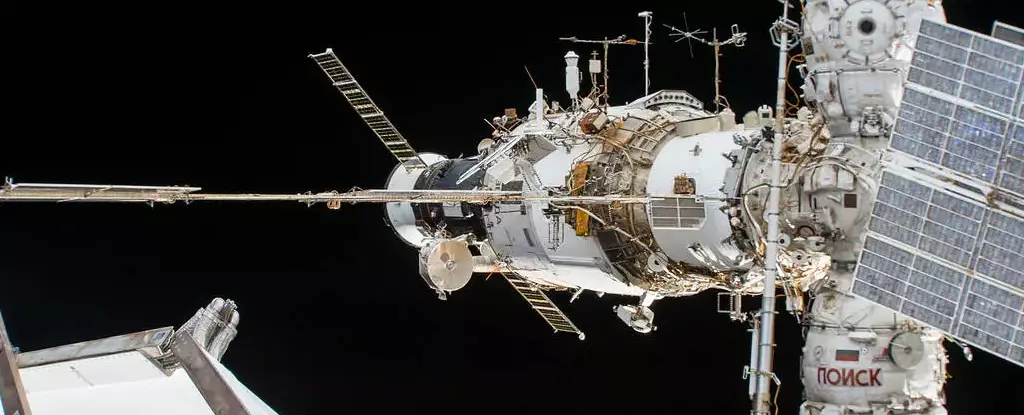The Russian segment of the International Space Station (ISS) experienced its third coolant leak in less than a year, raising concerns about the reliability of the country’s space program. While officials assured that the crew members were not in danger, the incident has sparked questions about the overall integrity and effectiveness of the Russian space systems.
Flakes of frozen coolant were observed spraying into space during an official live feed of the orbital lab provided by NASA. The incident happened around 1:30 pm Eastern Time. Radio chatter between US mission control and astronauts confirmed the presence of the leak. The Russian space agency Roscosmos stated that the coolant leak originated from the external backup radiator circuit of the Nauka module, which was delivered to the ISS in 2012. Despite the leak, temperatures in the affected unit remained stable, and there was no immediate threat to the crew or the station.
This coolant leak marks the third incident to affect the Russian side of the ISS within a year. In December 2022, NASA TV images showed white particles resembling snowflakes streaming out of a docked Soyuz MS-22 spacecraft. Speculation about the cause pointed to a potential collision with a micro meteorite. The spacecraft was subsequently returned to Earth uncrewed, and a replacement was sent a few months later. Due to this incident, two Russians and an American crew had to extend their mission to a year, only returning home recently. Additionally, in mid-February, the Russian Progress MS-21 cargo ship, which had been docked to the ISS since October 2022, also experienced a coolant leak. The frequency of these leaks raises concerns about the underlying issues within the Russian space systems and questions their reliability.
Space analyst Jonathan McDowell highlighted the significance of the repeated coolant leaks, stating that “You’ve got three coolant systems leaking – there’s a common thread there. One is whatever, two is a coincidence, three is something systematic.” This observation leads to speculation that the leaks might stem from systemic issues rather than random occurrences. McDowell suggests that a subcontractor company involved in the construction or maintenance of the affected modules could be responsible. The recurrence of these leaks highlights the deteriorating reliability of Russian space systems, especially when combined with other recent failures, such as the failed Moon probe in August. These incidents paint a less-than-favorable picture of the Russian space program.
The Russian space sector, a point of national pride in the country’s history, has been grappling with multiple challenges for years. Funding inadequacies, failures of missions, and corruption scandals have plagued the program. The leak incidents on the ISS further call into question the overall competence and integrity of the Russian space systems. These issues arise during a time when the relationship between Moscow and Washington is strained due to the Russian offensive in Ukraine and subsequent international sanctions. The ISS represents one of the few remaining areas of cooperation between the two nations, highlighting the importance of addressing the underlying problems within the Russian space program.
The occurrence of another coolant leak on the Russian segment of the ISS raises concerns about the reliability of the country’s space program. While the crew members were not in immediate danger, the repeated incidents of coolant leaks within a year point to potential systematic issues rather than isolated events. The Russian space program has been facing challenges for years, including funding deficits, mission failures, and corruption scandals. These incidents, coupled with the deteriorating reliability of their space systems, cast a shadow over the historic pride of the Russian space sector. The situation calls for critical evaluation and remedial actions to restore confidence in the Russian space program and ensure the continued viability of the ISS as a symbol of international collaboration in space exploration.


Leave a Reply